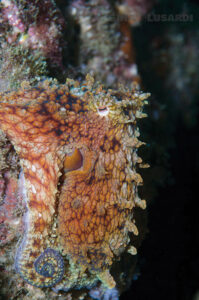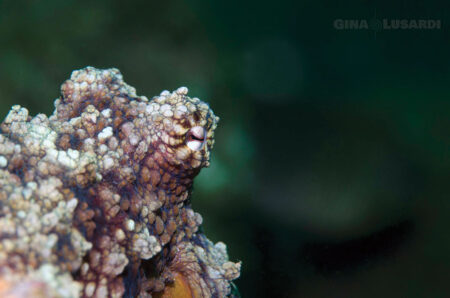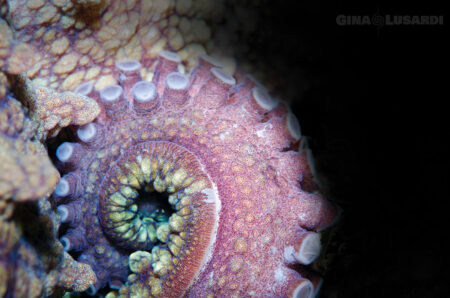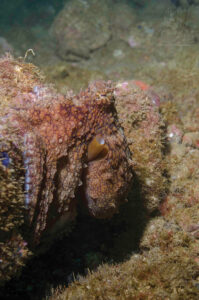The Amazing Octopus
It’s time to give you all an insight into another of our local residents. One that, at this time of year, is very frequently spotted, either squished into a hole or traveling across a reef, looking for its next target. One of the most fascinating creatures you may find is the Octopus. We have an abundance of them here in Manuel Antonio and they are spotted, this time of year, on many of the dives, but they are masters of camouflage and unless you know what you are looking for, you may miss them. With their ability to change color, it may look like a white blob on the reef, or if you’ve annoyed it and got too close, it may be flashing red. Not a good sign and not something we want to see as divers, as we like to interact with everything passively. So, to hopefully inspire you a little more, here are some interesting facts about the octopus.
 Octopuses or octopi?
Octopuses or octopi?
It is an ongoing debate about its official plural name as there are three choices in the world that you may have heard. Octopuses, Octopi, and Octopodes. What team are you on? Well, the correct plural is Octopuses. Octopuses may sound peculiar to some, but this is the preferred plural as stated in the English dictionary. If you want to know why exactly Octopi is not used, then hold onto your hats, here is the official explanation:
While “octopi” has become more popular and used, it’s wrong. This is because the letter “i” as a suffix to indicate a plural noun only applies to words with Latin roots. An example of this is Cactus, or “cacti” for more than one cactus. However, the word octopus has a Greek origin. This means actually, that the proper pluralization in this case would be “Octopodes”.
However, have you heard anyone using that? So, this particular word happens to employ a classic English way of pluralizing, and affixing a simple “es” at the end of octopus. Okay, wipe the sweat off your brow on that one. And Go Team Octopuses.
 Octopuses have blue blood.
Octopuses have blue blood.
Yes, they do! Many octopuses live in the deep ocean. To be able to survive the colder water temperatures, their blood needs to be better at transporting oxygen, when there isn’t much around. To assist with this, they have evolved a copper rather than iron-based blood called hemocyanin, which makes their blood blue. One disadvantage though is that it makes them very sensitive to changes in acidity putting them at a greater risk of effects from climate change.
Octopus arms have a mind of their own.
Two-thirds of an octopus’ neurons reside in its arms, not its head. Neurons are nerve cells that send messages all over your body to allow you to do everything from breathing to talking, eating, walking, and thinking. Because of all of these Neurons in their arms, they can act very independently from the rest of their body. For example, one arm can open a shell while the other is checking out a hole. You may see a casual arm sticking out of a reef crevice as you swim by.
 Octopuses can breathe and see through their skin.
Octopuses can breathe and see through their skin.
Octopuses can sometimes be seen hunting for crabs on shore, but how do they breathe when they are out of the water? Their secret is cutaneous respiration; they breathe through their skin. Sometimes, 40% of their oxygen intake can come through their skin.
They can also see through their skin. They have special light-sensitive proteins which means they can sense changes in light. Their skin can’t see images as clearly as their eyes, but it’s pretty cool to think an octopus could stick an arm out of its hole and be able to tell if it’s day or night.
Octopuses are extremely smart.
 The octopus possesses a greater brain for its body size than all other creatures and can perform many actions like tool usage and problem-solving. They have been seen to use tools underwater and, wild octopuses have also been shown to build little dens. They use stones to create sort of shields to protect the entrance to these dens. Octopuses have also been shown in experiments to solve mazes and complete tricky tasks to get food rewards. They’re also adept at getting themselves in and out of containers. This you can see around the reef, when they squeeze themselves into small holes and under ledges.
The octopus possesses a greater brain for its body size than all other creatures and can perform many actions like tool usage and problem-solving. They have been seen to use tools underwater and, wild octopuses have also been shown to build little dens. They use stones to create sort of shields to protect the entrance to these dens. Octopuses have also been shown in experiments to solve mazes and complete tricky tasks to get food rewards. They’re also adept at getting themselves in and out of containers. This you can see around the reef, when they squeeze themselves into small holes and under ledges.
So, I hope reading through this you have learned something new and fascinating about the octopus. And if you haven’t seen one, maybe you should come and join us on one of our dives, They are not the easiest to spot, but once you see them, if they are out and about you can watch them for hours and really appreciate how awesome they are!
Instagram and Threads @scubadivingcostarica,
@marineconservationcostarica

